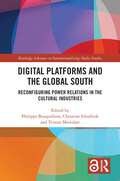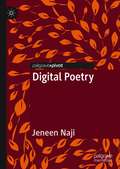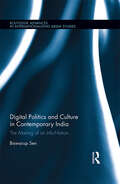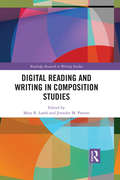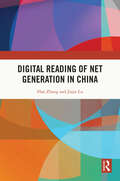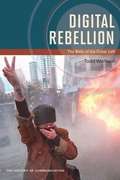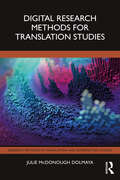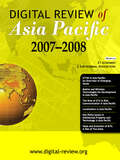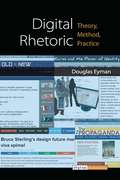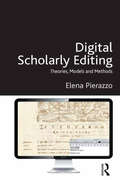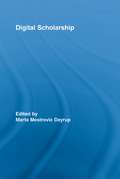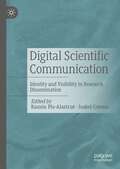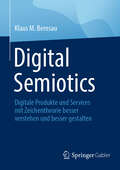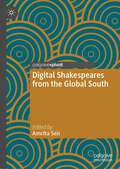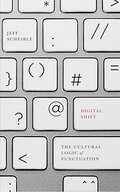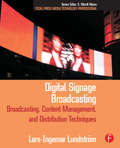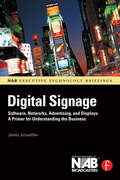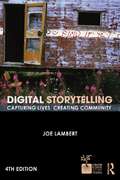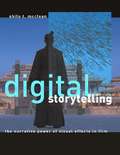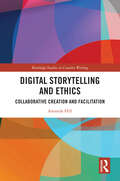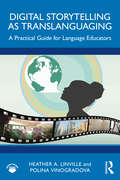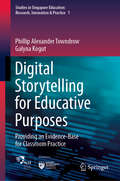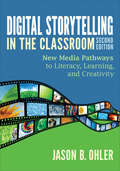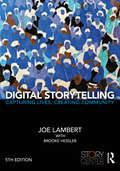- Table View
- List View
Digital Platforms and the Global South: Reconfiguring Power Relations in the Cultural Industries (Routledge Advances in Internationalizing Media Studies)
by Christine Ithurbide Tristan MattelartThis book addresses the issues raised by digital platforms in the Global South, with an emphasis on the cultural stakes involved. It brings together an interdisciplinary team of researchers – including political economists, socio-economists, geographers, media sociologists or anthropologists – who each explore these issues through an insightful case study at a local, national, regional or international scale. While studying the strategies of some of the main US-based Big Tech platforms or video streaming platforms towards the Global South, the chapters also consider the often-neglected active role local or regional actors play in the expansion of those Western digital players, and highlight the existence of a constellation of local or regional platforms that have emerged in Africa, Asia, Latin America or the Middle East. In addition to analysing the complex relationships of competition, collaboration or dependence between these diverse actors, this volume examines the ways in which the rise of these digital platforms has generated new forms of cultural entrepreneurship and participated in the reconfiguring of the conditions in which cultural contents are produced and circulated in the Global South. This volume will appeal to readers interested in the transnationalisation of cultural industries or in the social, political, economic, cultural and geopolitical dimensions of digital transformations and will be an important resource for students, teachers and researchers in media, communication, cultural studies, international relations and area studies programmes.
Digital Platforms and the Global South: Reconfiguring Power Relations in the Cultural Industries (Routledge Advances in Internationalizing Media Studies)
by Philippe Bouquillion Christine IthurbideThis book addresses the issues raised by digital platforms in the Global South, with an emphasis on the cultural stakes involved.It brings together an interdisciplinary team of researchers – including political economists, socio-economists, geographers, media sociologists or anthropologists – who each explore these issues through an insightful case study at a local, national, regional or international scale. While studying the strategies of some of the main US-based Big Tech platforms or video streaming platforms towards the Global South, the chapters also consider the often-neglected active role local or regional actors play in the expansion of those Western digital players, and highlight the existence of a constellation of local or regional platforms that have emerged in Africa, Asia, Latin America or the Middle East. In addition to analysing the complex relationships of competition, collaboration or dependence between these diverse actors, this volume examines the ways in which the rise of these digital platforms has generated new forms of cultural entrepreneurship and participated in the reconfiguring of the conditions in which cultural contents are produced and circulated in the Global South.This volume will appeal to readers interested in the transnationalisation of cultural industries or in the social, political, economic, cultural and geopolitical dimensions of digital transformations and will be an important resource for students, teachers and researchers in media, communication, cultural studies, international relations and area studies programmes.The Open Access version of this book, available at http://www.taylorfrancis.com, has been made available under a Creative Commons [Attribution-Non Commercial-No Derivatives (CC-BY-NC-ND)] 4.0 license.
Digital Poetry
by Jeneen NajiThis book examines contemporary forms of digital poetry in emerging technologies such as drones, machine learning, Instagram, virtual reality and mobile devices. Theoretical frameworks that engage with posthumanism, multimodality, hermeneutics and eco-writing are used to examine the changing shape of the literary artefact in the second age of machines. The book contextualises the necessity of a multidisciplinary approach for a complex artefact and gives a broad overview of the field and history of digital poetry as a subset of the genre of electronic literature. Naji examines Instapoetry and the literary algorithm, haptic hermeneutics and poetry apps. The discussion also engages with eco-writing and drone poetry, poetic mirror worlds, and mixed reality poetry, concluding with an examination of the future of poetics and literary expression in the second age of machines.
Digital Politics and Culture in Contemporary India: The Making of an Info-Nation (Routledge Advances in Internationalizing Media Studies)
by Biswarup SenThe relationship between information and the nation-state is typically portrayed as a face-off involving repressive state power and democratic flows: Twitter and the Arab Spring, Google in China, WikiLeaks and the U.S. State Department. Less attention has been paid to those scenarios where states have regarded information and its diffusion as productive of modernity and globalization. It is the central argument of this book that the contemporary nation-state, especially in the global South, is far from hostile to the current informational milieu and in fact makes crucial use of it in order to develop adequate modes of governance, communication and sociality in a networked world. This book focuses on India – an emerging country that has recently witnessed a "software miracle" – to highlight the critical role informatics has historically played in the national imagination and to demonstrate how the state, private capital and civic society have drawn upon and engaged the precepts and protocols of the information age to fashion an "info-nation."
Digital Reading and Writing in Composition Studies (Routledge Research in Writing Studies)
by Mary R. Lamb Jennifer M. ParrottAs digital reading has become more productive and active, the lines between reading and writing become more blurred. This book offers both an exploration of collaborative reading and pedagogical strategies for teaching reading and writing that reflect the realities of digital literacies. This edited scholarly collection offers strategies for teaching reading and writing that highlight the possibilities, opportunities, and complexities of digital literacies. Part 1 explores reading and writing that happen digitally and offers frameworks for thinking about this process. Part 2 focuses on strategies for the classroom by applying reading theories, design principles, and rhetorical concepts to instruction. Part 3 introduces various disciplinary implications for this blended approach to writing instruction. What is emerging is new theories and practices of reading in both print and digital spaces—theories that account for how diverse student readers encounter and engage digital texts. This collection contributes to this work by offering strategies for sustaining reading and cultivating writing in this landscape of changing digital literacies. The book is essential for the professional development of beginning teachers, who will appreciate the historical and bibliographic overview as well as classroom strategies, and for busy veteran teachers, who will gain updated knowledge and a renewed commitment to teaching an array of literacy skills. It will be ideal for graduate seminars in composition theory and pedagogy, both undergraduate and graduate; and teacher education courses, and will be key reading for scholars in rhetoric and composition interested in composition history, assessment, communication studies, and literature pedagogy.
Digital Reading of Net Generation in China
by Han ZHANG Jiajie LUWith the methodology of eye-tracking experiments, in-depth interviews and large-scale questionnaires across cities, this book provides a panoramic vision of digital reading and social interaction among the new generations in China. Growing up under the background of social transformation, cultural integration and technological progress, digital reading of the Chinese net generation presents complex characteristics. People born in the 1980s and 90s are better educated, have democratic consciousness, and have strong motivations for self-expression. Meanwhile, reading behaviours affect their content production, virtual identities, and socialization in the real world. The immense need for digital content fuels the digital reading industries. Internet literature, social media articles, reading APPs and e-reader devices have also benefited from media content and interface innovation in the market. This book provides a solid scientific foundation for reading promotion and guiding strategies in the context of digital media and offers empirical evidence for policy formulation of reading promotion and spiritual civilization in the digital age. The authors expand the perspective of communication studies on digital reading and analyze how the youth reads on digital devices and creates content for interest or profit. The book will be a great read for students and scholars of mass communication, media studies and digital publishing.
Digital Rebellion: The Birth of the Cyber Left
by Todd WolfsonDigital Rebellion examines the impact of new media and communication technologies on the spatial, strategic, and organizational fabric of social movements. Todd Wolfson begins with the rise of the Zapatistas in the mid-1990s, and how aspects of the movement--network organizational structure, participatory democratic governance, and the use of communication tools as a binding agent--became essential parts of Indymedia and all Cyber Left organizations. From there he uses oral interviews and other rich ethnographic data to chart the media-based think tanks and experiments that continued the Cyber Left's evolution through the Independent Media Center's birth around the 1999 WTO protests in Seattle. After examining the historical antecedents and rise of the global Indymedia network, Wolfson melds virtual and traditional ethnographic practice to explore the Cyber Left's cultural logic, mapping the social, spatial and communicative structure of the Indymedia network and detailing its operations on the local, national and global level. He also looks at the participatory democracy that governs global social movements and the ways the movement's twin ideologies, democracy and decentralization, have come into tension, and how what he calls the switchboard of struggle conducts stories of shared struggle from the hyper-local and dispersed worldwide. As Wolfson shows, understanding the intersection of Indymedia and the Global Social Justice Movement illuminates their foundational role in the Occupy struggle, Arab Spring uprising, and the other emergent movements that have in recent years re-energized radical politics.
Digital Research Methods for Translation Studies (Research Methods in Translation and Interpreting Studies)
by Julie McDonough DolmayaDigital Research Methods for Translation Studies introduces digital humanities methods and tools to translation studies. This accessible book covers computer-assisted approaches to data collection, data analysis, and data visualization and presentation, offering authentic examples of these approaches in both translation studies research and projects from related fields. With a diverse range of examples featuring various contexts and language combinations to ensure relevance to a wide readership, this volume covers the strengths and limitations of computer-assisted research methods, as well as the ethical challenges specific to this kind of research. This is an essential text for advanced undergraduate and graduate translation studies students, as well as researchers looking to adopt new research methods.
Digital Review of Asia Pacific 2007/2008
by IdrcThe biennial Digital Review of Asia Pacific is a comprehensive guide to the state-of-practice and trends in information and communication technologies for development (ICT4D) in Asia Pacific This third edition (2007-2008) covers 31 countries and economies, including North Korea for the first time. Each country chapter presents key ICT policies, applications and initiatives for national development. In addition, five thematic chapters provide a synthesis of some of the key issues in ICT4D in the region, including mobile and wireless technologies, risk communication, intellectual property regimes and localization. The authors are drawn from government, academe, industry and civil society, providing a broad perspective on the use of ICTs for human development.
Digital Rhetoric: Theory, Method, Practice
by Douglas EymanWhat is "digital rhetoric"? This book aims to answer that question by looking at a number of interrelated histories, as well as evaluating a wide range of methods and practices from fields in the humanities, social sciences, and information sciences to determine what might constitute the work and the world of digital rhetoric. The advent of digital and networked communication technologies prompts renewed interest in basic questions such as What counts as a text? and Can traditional rhetoric operate in digital spheres or will it need to be revised? Or will we need to invent new rhetorical practices altogether? Through examples and consideration of digital rhetoric theories, methods for both researching and making in digital rhetoric fields, and examples of digital rhetoric pedagogy, scholarship, and public performance, this book delivers a broad overview of digital rhetoric. In addition, Douglas Eyman provides historical context by investigating the histories and boundaries that arise from mapping this emerging field and by focusing on the theories that have been taken up and revised by digital rhetoric scholars and practitioners. Both traditional and new methods are examined for the tools they provide that can be used to both study digital rhetoric and to potentially make new forms that draw on digital rhetoric for their persuasive power.
Digital Scholarly Editing: Theories, Models and Methods (Digital Research in the Arts and Humanities #Vol. 4)
by Elena PierazzoThis book provides an up-to-date, coherent and comprehensive treatment of digital scholarly editing, organized according to the typical timeline and workflow of the preparation of an edition: from the choice of the object to edit, the editorial work, post-production and publication, the use of the published edition, to long-term issues and the ultimate significance of the published work. The author also examines from a theoretical and methodological point of view the issues and problems that emerge during these stages with the application of computational techniques and methods. Building on previous publications on the topic, the book discusses the most significant developments in digital textual scholarship, claiming that the alterations in traditional editorial practices necessitated by the use of computers impose radical changes in the way we think and manage texts, documents, editions and the public. It is of interest not only to scholarly editors, but to all involved in publishing and readership in a digital environment in the humanities.
Digital Scholarship (Routledge Studies in Library and Information Science)
by Marta Mestrovic DeyrupCollecting important original essays by librarians and archivists – all of whom are actively engaged in building digital collections – Digital Scholarship details both challenges and proven solutions in establishing, maintaining, and servicing digital scholarship in the humanities. This volume further explores the ways in which the humanities have benefited from the ability to digitize text and page images of historic documents, mine large corpuses of texts and other forms of records, and assemble widely dispersed cultural objects into common repositories for comparison and analysis--making new research questions and methods possible for the first time. The ten notable scholars included in Digital Scholarship offer a balanced view of the strengths and weaknesses of various approaches to digitization, reporting both progress and problems, examining new business models, new forms of partnerships, and the new technologies and resources that make many more library and archival services available. Librarians and library staff everywhere will find Digital Scholarship an essential text for the modern library and an illuminating resource for anyone looking to understand the changing face of research in the electronic age.
Digital Scientific Communication: Identity and Visibility in Research Dissemination
by Ramón Plo-Alastrué Isabel CoronaThis edited book analyses current trends in science communication and gathers research on practices related to the construction of digital identity and visibility, emerging conflicts related to the public availability and appropriation of scientific culture, and ways of validating and disseminating scientific knowledge in new digital contexts. Drawing on a selection of papers presented in the InterGedi Conference (Zaragoza, December 2021), the main goal of the volume is to identify and explore emerging professional practices and challenges in the digital communication of science through innovative multimodal genres. This book will be of interest to postgraduates, doctoral students, practitioners and researchers in the fields of discourse analysis, sociolinguistics, digital media, multimodality and communication studies.
Digital Semiotics: Digitale Produkte und Services mit Zeichentheorie besser verstehen und besser gestalten
by Klaus M. BernsauDieses Buch erklärt, wie Unternehmen mit Hilfe der Semiotik – der Lehre von den Zeichen – ihre digitalen Produkte und Dienstleistungen erfolgreicher machen können. Denn die Wellness-App, der Warenkorb im Onlineshop oder der Like-Button in der Produktansicht haben eines gemeinsam: Sie basieren auf digitalen Zeichen. Diese kundengerecht einzusetzen, wird immer mehr zum Schlüssel für das Produkterlebnis und damit zur Voraussetzung für den Produkterfolg. Die moderne Semiotik verbindet Sprachwissenschaft, Erkenntnistheorie, Anthropologie, Psychologie und Sozialwissenschaften zu einem faszinierenden Blick auf digitale Angebote. Der Autor zeigt, wie Unternehmen diese Erkenntnisse nutzen können und liefert ein praxisnahes Buch für Produktmanager*innen, Marketer*innen, Kommunikator*innen, Designer*innen, Softwareentwickler*innen – kurz: für alle, die für digitale Produkte und Dienstleistungen verantwortlich sind.
Digital Shakespeares from the Global South (Global Shakespeares)
by Amrita SenDigital Shakespeares from the Global South re-directs current conversations on digital appropriations of Shakespeare away from its Anglo-American bias. The individual essays examine digital Shakespeares from South Africa, India, and Latin America, addressing questions of accessibility and the digital divide. This book will be of interest to students and academics working on Shakespeare, adaptation studies, digital humanities, and media studies.Included in this volume, the chapter on “Finding and Accessing Shakespeare Scholarship in the Global South: Digital Research and Bibliography” by Heidi Craig and Laura Estill is available open access under a Creative Commons Attribution 4.0 International License via link.springer.com.
Digital Shift: The Cultural Logic of Punctuation
by Jeff ScheibleEmoticons matter. Equal signs do, too. This book takes them seriously and shows how and why they matter. Digital Shift explores the increasingly ubiquitous presence of punctuation and typographical marks in our lives⎯using them as reading lenses to consider a broad range of textual objects and practices across the digital age. Jeff Scheible argues that pronounced shifts in textual practices have occurred with the growing overlap of crucial spheres of language and visual culture, that is, as screen technologies have proliferated and come to form the interface of our everyday existence. Specifically, he demonstrates that punctuation and typographical marks have provided us with a rare opportunity to harness these shifts and make sense of our new media environments. He does so through key films and media phenomena of the twenty-first century, from the popular and familiar to the avant-garde and the obscure: the mass profile-picture change on Facebook to equal signs (by 2.7 million users on a single day in 2013, signaling support for gay marriage); the widely viewed hashtag skit in Jimmy Fallon&’s Late Night show; Spike Jonze&’s Adaptation; Miranda July&’s Me and You and Everyone We Know; Ryan Trecartin&’s Comma Boat; and more. Extending the dialogue about media and culture in the digital age in original directions, Digital Shift is a uniquely cross-disciplinary work that reveals the impact of punctuation on the politics of visual culture and everyday life in the digital age.
Digital Signage Broadcasting: Content Management and Distribution Techniques
by Lars-Ingemar LundstromDigital Signage Broadcasting is a perfect introduction to this new world of opportunities for media professionals in all areas. Whether you are in engineering, IT, advertising, or management, you will gain knowledge on the operations of digital signage systems, content gathering, customer billing, and much more on this new exciting media.This book includes coverage of basic elements, examples of advanced digital signage applications, as well as traffic capacity calculations that may be guidance when choosing means of distribution as physical media, broadband or satellite. Digital Signage Broadcasting helps you discover the fascinating possibilities of this new convergence medium with hundreds of author-created color 3D illustrated graphics and real-life photographs showing the capability and future of digital signage.
Digital Signage: Software, Networks, Advertising, and Displays: A Primer for Understanding the Business
by Jimmy SchaefflerDigital Signage gives you macro and micro views of the burgeoning digital signage industry. Whether you are looking for new opportunities or to expand your business, with this book you will be able to clearly understand and accurately analyze the developments, trends and projections. As part of the NAB Executive Technology Briefing series, this book features the future impact of the technology across many different industries and platforms. Explanations of hardware such as displays, servers, and PCs, software such as dynamic on-screen content and software management programs, and technologies like systems integrations and network infrastructures are all covered.
Digital Storytelling
by Joe LambertListen deeply. Tell stories. This is the mantra of the Center for Digital Storytelling (CDS) in Berkeley California, which, since 1998 has worked with nearly 1,000 organizations around the world and trained more than 15,000 people in the art of digital storytelling. In this revised and updated edition of the CDS's popular guide to digital storytelling, co-founder Joe Lambert details the history and methods of digital storytelling practices. Using a "7 Steps" approach, Lambert helps storytellers identify the fundamentals of dynamic digital storytelling--from seeing the story, assembling it, and sharing it. As in the last edition, readers of the fourth edition will also find new explorations of the applications of digital storytelling and updated appendices that provide resources for budding digital storytellers, including information about past and present CDS-affiliated projects and place-based storytelling, a narrative-based approach to understanding experience and landscape. A companion website further brings the entire storytelling process to life. Over the years, the CDS's work has transformed the way that community activists, educators, health and human services agencies, business professionals, and artists think about story, media, culture, and the power of personal voice in creating change. For those who yearn to tell multimedia stories, Digital Storytelling is the place to begin.
Digital Storytelling
by Shilo T. MccleanComputer-generated effects are often blamed for bad Hollywood movies. Yet when a critic complains that "technology swamps storytelling" (in a review of Van Helsing, calling it "an example of everything that is wrong with Hollywood computer-generated effects movies"), it says more about the weakness of the story than the strength of the technology. In Digital Storytelling, Shilo McClean shows how digital visual effects can be a tool of storytelling in film, adding narrative power as do sound, color, and "experimental" camera angles--other innovative film technologies that were once criticized for being distractions from the story. It is time, she says, to rethink the function of digital visual effects. Effects artists say--contrary to the critics--that effects always derive from story. Digital effects are a part of production, not post-production; they are becoming part of the story development process. Digital Storytelling is grounded in filmmaking, the scriptwriting process in particular. McClean considers crucial questions about digital visual effects-- whether they undermine classical storytelling structure, if they always call attention to themselves, whether their use is limited to certain genres--and looks at contemporary films (including a chapter-long analysis of Steven Spielberg's use of computer-generated effects) and contemporary film theory to find the answers. McClean argues that to consider digital visual effects as simply contributing the "wow" factor underestimates them. They are, she writes, the legitimate inheritors of film storycraft.
Digital Storytelling and Ethics: Collaborative Creation and Facilitation (Routledge Studies in Creative Writing)
by Amanda HillDigital Storytelling and Ethics: Collaborative Creation and Facilitation provides a method for analyzing digital storytelling practices that focuses on the rhetorical, dialogic, co-productive, creative storymaking space rather than the finished stories or the technologies. Looking through a new media lens, Amanda Hill situates the digital storytelling genre and writing practice as a co-creative media process created between writers, storytellers, educators/facilitators, institutions, and the audience, and discusses the inter-relationships within the collaborative writing workshop as well as in those found in the dissemination of the final digital stories. Digital Storytelling and Ethics provides a reflexive look at the responsibility of the facilitator in co-creative digital storytelling writing spaces and makes use of diverse international case studies as examples. Hill shows that writing educators/facilitators should interpret their roles within the collaborative creation process. This will ensure that responsible facilitation practices based in witnessing guide the storytelling process and create an environment that treats participants as subjects with the ability to respond to the world. This innovative book is an essential read for collaborative digital writers and facilitators.
Digital Storytelling as Translanguaging: A Practical Guide for Language Educators
by Heather A. Linville Polina VinogradovaThis innovative, accessible book is an introduction to using digital storytelling in language teaching, with a focus on English as an Additional Language (EAL) instruction. Linville and Vinogradova provide a clear framework that addresses translanguaging and multimodal meaning making in teaching multilingual learners (MLs) through use of digital storytelling.This book provides detailed guidance on how to incorporate digital storytelling into language teaching, building on recent developments in the fields of TESOL and language education that position multilingualism and multiliteracies as important components of any language instruction. Through this text and accompanying activities, readers will understand how to work with MLs to create multimodal digital texts. This book offers an easy-to-follow, step-by-step process for language educators to follow to support MLs’ digital storytelling projects in any EAL classroom. Featured digital storytelling projects from EAL practitioners in various contexts, as well as multiple examples and resources, are included for each stage of the process, always grounded in contemporary TESOL theories (e.g., critical pedagogy, culturally responsive teaching, translanguaging, and a pedagogy of multiliteracies). This framework supports the development of multilingualism and multiliteracies and can be adapted by educators of other world languages for any language education setting.Grounded in contemporary TESOL theories, this book is an essential text for courses on technology in TESOL and TESOL methods courses, as well as for language educators.
Digital Storytelling for Educative Purposes: Providing an Evidence-Base for Classroom Practice (Studies in Singapore Education: Research, Innovation & Practice #1)
by Phillip Alexander Towndrow Galyna KogutThis book is an exposition of a curriculum innovation within the complex yet fertile ground of school-based education in Singapore. Beyond straightforward descriptions and protocols, this book purposefully connects classroom practices with theories in a clear, uncomplicated way. The result provides a series of rationales for action, reflection and understanding that other publications in digital storytelling sometimes fail to cover or explain in sufficient detail. Broadly, these include digital multimodal authorship; teachers’ and students’ storytelling task design and assessment; the use of digital storytelling as a reflective and reflexive expression of teachers’ professionalism; and dialogism in classroom practice.
Digital Storytelling in the Classroom: New Media Pathways to Literacy, Learning, and Creativity
by Jason B. OhlerA must-read for incorporating digital literacy into your classroom! Equip your students with essential 21st-century media literacy skills, as they read, write, speak, and create art within the context of digital storytelling, and reach deeper understandings in all areas of the curriculum! In this second edition, both novice and technologically adept K-12 educators will find: Practical techniques to combine storytelling with curriculum content Tips for exploring effective storytelling principles through emerging digital media as well as via traditional literacy skills in reading, writing, speaking, and art Visual aids and video clips that illustrate best practices in media composition
Digital Storytelling: Capturing Lives, Creating Community
by Joe Lambert Brooke HesslerIn this revised and updated edition of the StoryCenter's popular guide to digital storytelling, StoryCenter founder Joe Lambert offers budding storytellers the skills and tools they need to craft compelling digital stories. Using a "Seven Steps" approach, Lambert helps storytellers identify the fundamentals of dynamic digital storytelling – from conceiving a story, to seeing, assembling, and sharing it. Readers will also find new explorations of the global applications of digital storytelling in education and other fields, as well as additional information about copyright, ethics, and distribution. The book is filled with resources about past and present projects on the grassroots and institutional level, including new chapters specifically for students and a discussion of the latest tools and projects in mobile device-based media. This accessible guide’s meaningful examples and inviting tone makes this an essential for any student learning the steps toward digital storytelling.
